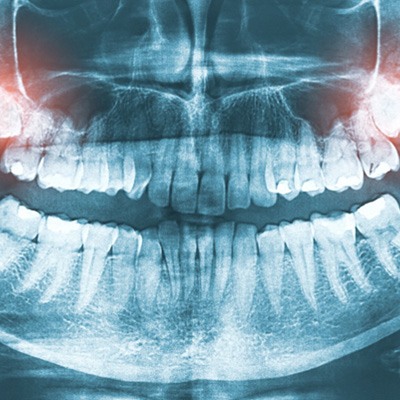Wisdom Tooth Extractions – McKinney, TX
Keeping Your Smile Healthy
Are you struggling with chronic jaw pain? If so, the solution may be to have your wisdom teeth removed! When they emerge, they can create all sorts of issues, including an increased risk of tooth decay and persistent dental discomfort. The good news is that Dr. Deval Parmar can carefully remove them, restoring your pain-free smile in the process. If you want to schedule an appointment with us to learn more, contact our McKinney dental team. Otherwise, keep reading!
Why Choose Archway Dental for Wisdom Tooth Extractions?
- Years of Experience and Training
- Nitrous Oxide or IV Sedation Available
- Children and Adults Welcome
What are Wisdom Teeth?

You may be familiar with the name, but what exactly are wisdom teeth? In short, they are the third set of molars. Since they typically make an appearance during the late teenage and early adult years, they earned the nickname “wisdom teeth.”
Why Do Wisdom Teeth Need to Be Removed?

Although our ancestors needed the third set of molars, many people nowadays don’t. In fact, these teeth can cause many problems, including pushing the other teeth out of alignment, erupting at an angle, or causing an infection. In these cases, Dr. Parmar will likely recommend wisdom tooth extractions in McKinney, TX. We’ll take the time to explain the situation and honestly review the treatment options so that you feel confident moving forward.
What to Expect from the Wisdom Teeth Procedure

You might be surprised to hear that the wisdom teeth procedure is relatively straightforward and completely painless. After thoroughly numbing your mouth and checking that you’re ready to begin, our McKinney dentist will gently rock each tooth loose before wiggling them free from the sockets. Of course, if your wisdom teeth are trapped beneath your gumline, then she will need to create a small incision in your gums first. As we mentioned at the beginning of this section, you won’t feel anything since your mouth will be completely numb. If you’re at all concerned, we can also discuss adding sedation dentistry to your treatment plan.
Recovering from Wisdom Teeth Extraction

After wisdom teeth are extracted, it is important to properly care for the site. Keep the gauze in place until the bleeding stops, which should be within a couple of hours. Switch out the gauze as it becomes soaked and apply a cold compress to your face to manage the swelling. Make sure that you allow a blood clot to form on the surgical site. This protects the vulnerable tissue underneath from bacteria.
For a few days, you should eat softer foods and slowly build back up to your normal diet. Avoid using a straw because the clot can easily become dislodged with the sucking motion, likely leading to an infection called dry socket. If you follow these instructions, you should heal well and recover as quickly as possible.
Wisdom Tooth Extractions FAQs
Why Do We Have Wisdom Teeth?
Given the trouble they cause, you may wonder why people even have wisdom teeth. The answer to that question has to do with human evolution.
You see, wisdom teeth once benefited the early humans. They let our ancestors subsist on many raw foods – meat, berries, nuts, roots, etc. Such things were easier to chew when these humans had “third molars.”
All that said, people can now cook, bake, cut, and prepare their meals. This change in how humans eat means wisdom teeth aren’t needed anymore. That has led the human jaw to shrink over its evolutionary history. As a result, wisdom teeth do more harm than good when they start to erupt.
Is Wisdom Tooth Removal Painful?
To be honest, wisdom tooth removal is a pain-free process. It shouldn’t cause you any discomfort or aches.
The fact is that our team will numb your mouth before surgery starts. By performing this step, we’ll limit your body’s ability to feel pain. This effect should make your procedure a very painless one. At most, you’ll only sense a slight pressure as Dr. Parmar gently rocks your tooth back and forth.
Of course, you may have some post-surgery soreness. The anesthetic we apply will wear off eventually. Still, this discomfort is common and should fade quickly. You should feel back to normal within a week.
What’s the Best Age to Get Wisdom Teeth Removed?
Technically, there isn’t a set, universal age by which wisdom teeth must be removed. Patients can have them extracted at any point in their adult years. However, treatment often turns out better when done in early adulthood.
The truth is that wisdom tooth removal is easier for younger patients. As a person ages, the roots of their wisdom teeth grow longer and embed themselves in the jaw. This process makes removal complicated as it goes on, leading to longer healing periods. Meanwhile, extraction is smoother when the tooth growth is minimal. It’s also easier to plan when a patient only has to worry about missing school instead of work.
How Soon Can I Eat After Wisdom Teeth Removal?
After wisdom tooth removal, waiting an hour or two before eating is best. You should otherwise follow your dentist’s instructions on the matter. Even if you feel hungry, waiting a little to eat is crucial. Not doing so will harm your treatment results.
Remember, your mouth will feel numb for a while after your surgery. It’ll take time for the treatment anesthetic to wear off. If you try eating in that state, you could bite your tongue, lip, or cheeks and cause oral damage. The better move is to follow a liquid diet during the first 24 hours after surgery. From there, you can eat soft foods for a few days until you’re more comfortable.

